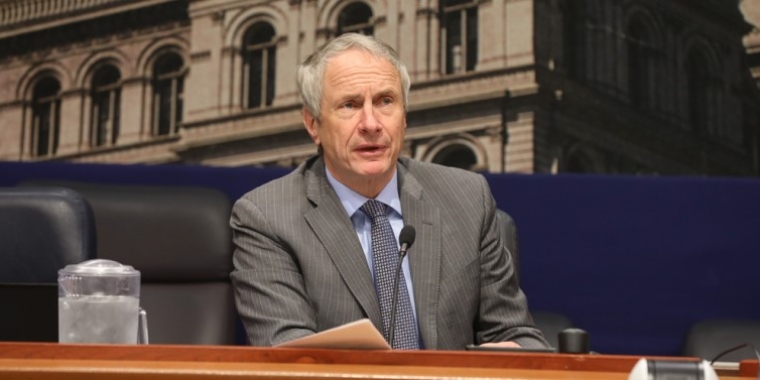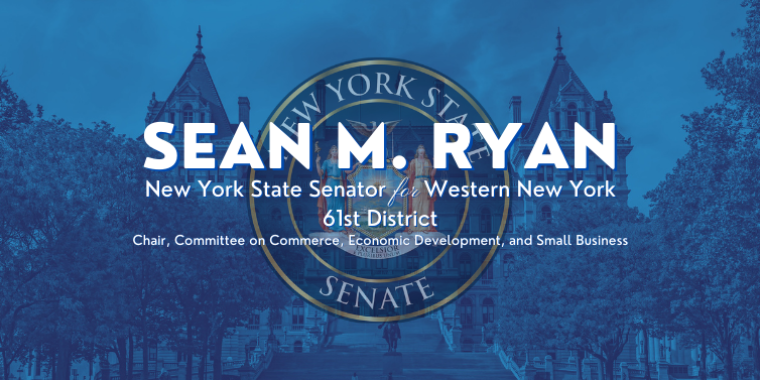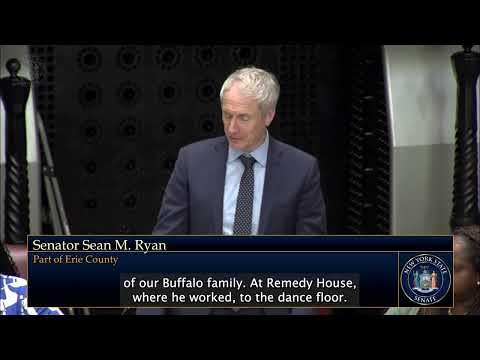Bill To Ban Non-Competes Advances As Senate Hearing Reveals Their Overwhelmingly Negative Impact On New York
May 23, 2023

BILL TO BAN NON-COMPETES ADVANCES AS SENATE HEARING REVEALS THEIR OVERWHELMINGLY NEGATIVE IMPACT ON NEW YORK
Joint Public Hearing Uncovers the Detrimental Effects Non-Compete Agreements Have Had on New York’s Workers, Consumers, and Small Businesses
Bill to Ban Non-Competes in New York Advances from Labor Committee
ALBANY – Today, May 23, 2023, New York State Senator Sean Ryan announced that the Senate Committee on Labor voted to advance Senator Ryan’s bill (S.3100) to prohibit the use of non-compete agreements in New York. The vote coincided with a joint public hearing to investigate the impacts of non-compete agreements on New York State.
The hearing was conducted by Senator Ryan, chair of the Senate Committee on Commerce, Economic Development and Small Business, and Senator Jessica Ramos, chair of the Senate Committee on Labor. It featured written and oral testimony from 19 witnesses, including labor lawyers, the Office of the Attorney General of New York, and a publicly traded technology company. Personal testimony from a chiropractor, a tattoo artist, and a lighting designer who have been bound by non-compete agreements revealed the breadth of professions impacted by non-competes in New York.
The personal experiences and professional expertise provided as testimony outlined the overwhelmingly detrimental effects that non-compete agreements have on individuals, businesses, and the economy in New York State. Among the findings was the fact that even non-compete agreements that may technically be unenforceable serve as functional restrictions on employees who do not have the resources to fight them in a court of law. Further testimony demonstrated that non-compete agreements also often make it difficult for businesses to find qualified employees. Multiple medical professionals attested that they can also have a detrimental impact on consumers in fields such as healthcare, where they disrupt continuity of care.
Senator Sean Ryan said, “Today’s hearing was full of eye-opening testimony about the many negative effects non-compete agreements have had on our state. The testimony we heard today demonstrated unequivocally that they are not only bad for workers, but for businesses and the state economy as a whole. I would like to thank all of our witnesses for their testimony, and I would like to give a special thank you to the workers who traveled to Albany in a personal capacity to tell their stories in an effort to help ensure that other people will not have to go through the same ordeals they have endured.”
About S.3100
This bill would prevent employers from restricting their employees’ future employment options through the use of non-compete agreements. Notably, the bill does not prohibit the use of confidentiality agreements or non-solicitation agreements, leaving businesses with multiple mechanisms to protect proprietary information without unnecessarily limiting their employees’ mobility.
Select excerpts from written and oral testimony can be found below:
Dr. Jonathan Halpert, Medical Provider/Small Business Owner
“Medical non-compete clauses are inherently unfair and are ultimately counterproductive, only serving to diminish access to a community’s vital health care resources. … It’s time New York joins the ranks of other more progressive states, enacting legislation like S.3100, to help turn New York from its historic place as one of the least physician friendly places to work, encouraging more doctors to come into the state, and dissuading those that are here from having to move out of New York, in order to escape the archaic, unfair, and counterproductive prohibitions of their employment agreements.”
Karen Cacace, Chief of the Labor Bureau, Office of the Attorney General of New York
“[S.3100] takes out confidentiality agreements, and it takes out non-solicitation agreements, and that’s what employers, really, are most concerned about – that if they actually do have proprietary information, that that is not taken and used to start a competing business, and that’s still very protected. Everything else is just employees looking for better jobs. And that’s what we should all want, right? We want employees to be able to find good jobs. We want the employers that are offering good jobs to be able to hire people and not, as [Dr. Halpert] testified, not be able to find people because they’re subject to non-competes. The more freedom employees have to look for work and employers have to hire them, the better services that will be available to the public.”
Miriam Clark, Chair of the Legislative Committee of the National Employment Lawyers Association (New York affiliate)
“The economy of the State of New York is also harmed because non-compete agreements undermine the mobility of the most productive and dynamic employees who are the engines of economic growth. California has successfully grown its economy while imposing a ban on non-compete agreements and its high technology sector has been the model of growth over the past 50 years, growth that many economists attribute to its ban on non-compete clauses. By limiting the movement of our most productive employees, we stifle the growth of the New York economy that comes along with such mobility.”
Kenan Fikri & Catherine Lyons, Economic Innovation Group
“Non-competes pose threats to the broader economy. A dynamic economy depends upon knowledge spillovers—not the spilling of trade secrets that can be protected through other means, of course, but the productivity-boosting exchanges that happen when individuals collaborate, start new enterprises, or take the body of their lifetime experiences and apply them in new contexts. Non-compete agreements contribute directly to the pile of forces undermining many such processes integral to our continued prosperity.”
Miriam Clark, Chair of the Legislative Committee of the National Employment Lawyers Association New York affiliate
“Even high-level and sophisticated employees, when faced with restrictive covenants, find they have no bargaining power when it comes to employers who insist on them. … The unequal bargaining power is even more acute when a non-compete agreement is demanded of an existing employee.”
Najah Farley, National Employment Law Project
“Noncompete provisions are usually presented by employers in a ‘take it or leave it’ fashion, and most employees and independent contractors do not have the power to change them or negotiate their implementation. Workers are forced to sign or forego the job opportunity, contract, or promotion. Studies have shown that workers rarely negotiate on the issue of noncompetes, largely because many receive the noncompete as a condition of a job offer or after accepting the job offer and lack the power to do so.”
Melanie Lee, Tattoo Artist
“In November 2020, I was offered a position at [a tattoo studio]. My duties were to open and close the shop and assist other artists during the day, in exchange for having a space to practice tattooing on fake skin, unpaid. Once I was ready to work with clients, the shop would take 50% commission of each tattoo, and eventually, with more experience, 40% commission. Two months later, I was presented with a non-compete contract for the first time. I was told that if I did not sign, I would have to leave the shop. The contract stated that I must remain at the shop for two years after signing. If I left prior to those two years, I would owe the shop $15,000 in liquidated damages. Additionally, I was not allowed to work within a 20-miles of the shop for the next two years after my departure, whenever that may be. … Afraid of losing this opportunity, I signed the contract. Tattooing became one of the most fulfilling parts of my life. I quit my corporate job and successfully made the switch into being a full-time artist. Unfortunately, I also realized that [this studio] was not a safe workplace. … After careful consideration, I quit in March 2022, a little over one year later. An invoice for $15,000 quickly followed, along with threats of legal action if I did not cease tattooing immediately. It claims that despite taking advantage of my free labor, taking 50% of almost every paycheck, and despite me providing many of my own supplies, I owed [the studio] $15,000 in incurred damages.”
Dr. Morgan Stevens, Chiropractor
“I had a meeting with my boss about some of the things that I was concerned about in practice. Some of those things were the level of care that people were receiving. I just didn’t agree with some of his methods, and I was hoping to come to an understanding, or an agreement, or a compromise. Three days later, he called me in on a Sunday and told me not to come back. … I was given a 25-mile radius non-compete for two years. In the area that I live in (Watertown, NY), that’s pretty significant, because it’s a 45- to 60-minute drive in any direction, and if you go north, you’re in Canada, and I’m not licensed to practice in Canada.”
Richard Tatum, Lighting Designer
“I was let go from my employment of 11-1/2 years mid-year in 2009 during the financial crisis. My employer (a lighting/audio/video production company in the New York City special events industry) was deeply in financial distress and seeking to cut expenses wherever possible. I was let go and my employer cautioned me that the non-compete was still in effect and that I should not seek employment with a firm that competed with the company. … I consulted with an attorney and was advised that I should go ahead and seek new employment - which I did and was successful. … In the late fall of 2009, my former employer served notice of a lawsuit and I spent the next year fighting back. … In December of 2010, the matter was finally brought before a judge who ordered my former employer to provide financial proof that I had caused irreparable harm. My former employer chose to drop the lawsuit rather than pursue the case. I spent $35,000 in legal fees fighting him off for a year. This was a tremendous amount of money for me.”
Prabhu Sigamani, Director of Restaurant Opportunities Centers of New York
“In our experience, non-compete clauses are often buried in the fine print of employment contracts and, in many cases, are not flagged by employers; many workers do not even recall signing a non-compete agreement until an employer attempts to enforce it.”
Veeva Systems Inc.
“Over the last decade, Veeva has provided for the legal defense of more than 20 employees sued or threatened with suit by former employers trying to enforce abusive non-compete agreements at an estimated expense of over $10 million, including lawsuits filed in New York. For most companies (especially smaller ones), the mere possibility of legal spending at that scale is enough to discourage them from hiring an employee who might even arguably be subject to a non-compete agreement, and that’s true even when the non-compete is overly broad and not likely to survive legal challenge. In this way, the threat of legal action over non-compete agreements limits the recruiting pool and available workforce, especially for less well-funded companies, and serves to entrench larger market leaders that have the financial means to file lawsuits (or credibly threaten to do so) around the country.”
Evan Starr, Economist
“This is not a classic firm vs. worker issue because firms are on both sides of the equation: Firms may not want to lose workers to competitors, but they would like to hire from competitors. Furthermore, firms benefit more broadly from being integrated in a dynamic environment, and the evidence overwhelmingly shows that noncompetes reduce dynamism by chilling mobility and entrepreneurship.”

